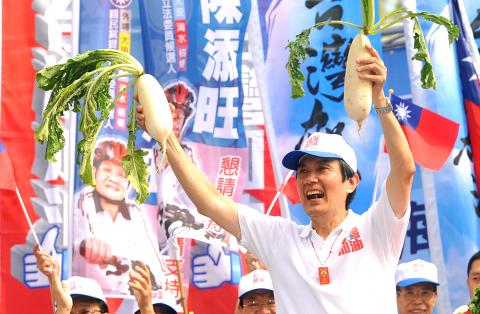President Ma Ying-jeou (馬英九) yesterday stepped up his re--election campaign in Greater Taichung by opening two campaign headquarters in the area, and expressed his confidence in winning by a large margin in this pivotal battleground in the presidential election on Jan 14.
Opinion polls show the race with Democratic Progressive Party (DPP) Chairperson Tsai Ing-wen (蔡英文) is too close to call.
Greater Taichung, a special municipality established by the merger of Taichung City and Taichung County, is considered to be a crucial swing area in the January presidential and legislative elections.

Photo: Liao Yao-tung, Taipei Times
Despite being a traditional Chinese Nationalist Party (KMT) stronghold, the party’s performance in the mayoral election last year sparked concern within the pan-blue camp as the DPP’s then-mayoral candidate, Su Jia-chyuan (蘇嘉全), lost to Taichung Mayor Jason Hu (胡志強) by only a small margin.
Su is now running on the same ticket with Tsai.
The official establishment of Ma’s campaign headquarters in Fongyuan District (豐原) and downtown Taichung attracted thousands of supporters.
“We received over 500,000 votes in Taichung County in the 2008 presidential election, 150,000 votes more than the DPP, and I am certain that passion endures and will help me win this election,” Ma said to the crowd in Fongyuan.
KMT officials and local heavyweights from different factions attended the ceremonies. Former Taichung County commissioner Chen Keng-chin (陳庚金), former KMT legislator Chen Jie-ju (陳傑儒) and former Taichung County Council speaker Lin Min-lin (林敏霖) are all set to join the campaign team and stump for Ma.
The KMT is hoping to isolate People First Party (PFP) Chairman James Soong’s (宋楚瑜) supporters in the area by focusing on party unity. Soong confirmed his run for the presidency on Tuesday by sending more than 355,000 signatures on his presidential petition to the Central Election Commission.
Meanwhile, Ma launched his home-stay campaign strategy in Greater Taichung on Friday night when he stayed at the house of farmer Chiang Wen-sheng (江文盛). His first home stay attracted much media coverage because Chiang is the brother of former National Security Council deputy secretary--general Antonio Chiang (江春男) under the former DPP administration.
Yesterday morning, Ma had breakfast with Chiang Wen-sheng’s family and then visited the family’s orange farm.
When asked about his interaction with Ma, Antonio Chiang said he returned to Fongyuan on Friday night to meet with Ma as a courtesy, but the two did not discuss politics.
“My political views and opinions on current issues are public knowledge,” said Antonio Chiang, currently a political columnist for the Chinese-language Apple Daily.
Chiang Wen-sheng is also the uncle of former Government Information Office minister Johnny Chiang (江啟臣).
Johnny Chiang, who is a KMT legislative candidate in the area, presented Ma with a lucky charm, a gift he said was made by a group of grandmas who wished the president all the best in the election and trusted him to bring peace and prosperity to the nation.
Wearing the charm as he campaigned for party candidates throughout the day in Greater Taichung, Ma said such home stays helped him better understanding local issues, and he promised to promote the continued development of the municipality if re-elected.
“Living a safe and peaceful life is the basic wish of all Taiwanese, and I promise to take this good luck charm from local grandmas and dedicate myself to maintaining peace and prosperity throughout Taiwan,” he said.

REPORT: Taipei has expressed an interest in obtaining loitering munitions matching the AeroVironment Switchblade 300 or the Anduril Altius-600, ‘Foreign Policy’ said Taiwan is seeking US-made kamikaze drones in an apparent concession to pressure from Washington to focus on asymmetric capabilities to defeat or deter a Chinese attack, Foreign Policy said in a report on Wednesday. Taipei has expressed an interest in obtaining AeroVironment Switchblade loitering munitions or other devices with similar capabilities, it said, citing four sources familiar with the matter commenting on condition of anonymity. The Switchblade 300 is a tube-launched drone designed for attacking ground troops, while its larger sibling, the Switchblade 600, could be used to destroy tanks and entrenched troops. Ukraine has utilized both systems extensively in its fight against

Police officers yesterday morning apprehended the prime suspect of a triple homicide case, after raiding the suspect’s hideout in Taichung. They transported the suspect to New Taipei City for questioning and recorded his statement last night. The suspect, identified as a 24-year-old man surnamed Chang (張), is believed to have used his hands to strangle his wife, surnamed Chen (陳), 29, along with his three-year-old son from a previous marriage and his wife’s mother, 69. The three dead bodies were wrapped in blankets when they were discovered inside their apartment in New Taipei City’s Sanchong District (三重) on Saturday. Chang was holding a

Hungarian Member of Parliament Tompos Marton said he considers Taiwan to be a better alternative to China as a strategic partner. Marton, who is the vice president of the opposition Momentum Party, made the remarks in an interview with the Central News Agency on Sunday. He draped a Republic of China flag across his shoulders to protest Chinese President Xi Jinping’s (習近平) visit to the capital city, Budapest, on Thursday last week, and openly voiced support for Taiwan on social media. He said in the interview that he wanted to remind the world that there were alternatives to China, and that “Taiwan has

A female physician at New Taipei City’s Shuang Ho Hospital was bullied and made to work for 32 consecutive hours by a senior colleague while pregnant before later having a miscarriage, an internal investigation found, the hospital said on Monday. The perpetrator has been removed from his post, the hospital said. The attending physician in the hospital’s Medical Imaging Department, identified by the pseudonym Y, earlier on Monday told reporters that she had been bullied by a male senior colleague who arranged shifts in her department. In January, shortly after she became pregnant, Y asked the department director if she could avoid overnight